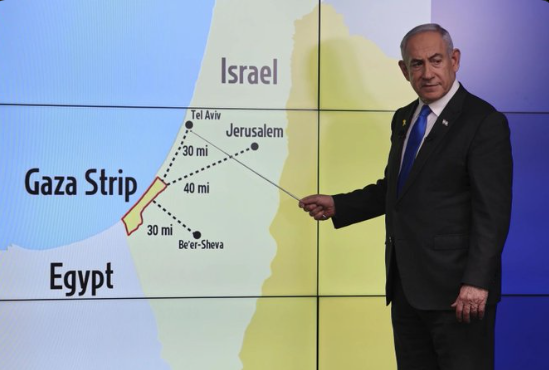Israeli Prime Minister Benjamin Netanyahu remains steadfast in his position that Israeli forces will not vacate the Philadelphi Corridor, a critical buffer zone along the southern Gaza border with Egypt. In discussions with international media in Jerusalem, Netanyahu expressed a slight openness to alternatives that could replace Israeli military presence along the border as part of a potential permanent ceasefire agreement, yet he remains skeptical about such possibilities materializing.
Israeli Prime Minister Benjamin Netanyahu:
We cannot retreat from Philadelphi corridor (Palestinian-Egyptian border) because HAMAS needs it. If we retreat, they can smuggle prisoners into Egypt. pic.twitter.com/jzaWVWqzK1
— Journalite (@journaIite) September 3, 2024
Netanyahu underscored the strategic importance of maintaining Israeli troops in the Philadelphi Corridor to prevent the smuggling of weapons and potentially hostages across the border. This stance comes amidst Hamas’s critique, as reported by Reuters, labeling Netanyahu’s decision as an obstacle to achieving a ceasefire, urging international pressure on Israel.
Further emphasizing the necessity of a secure border, Netanyahu articulated the conditions for any ceasefire agreement, which include ensuring the corridor remains impenetrable. He conveyed a willingness to consider realistic, proven alternatives to a military presence if they can demonstrate effective security consistently over time.
Israel will not remove its troops from a narrow strip of land on the Gaza side of the border with Egypt.@AliBunkallSKY explains why Netanyahu insisted on retaining control of the corridor.https://t.co/PAiZ4D1jU3
Sky 501, Virgin 602, Freeview 233 and YouTube pic.twitter.com/fGdgy9ItNK
— Sky News (@SkyNews) September 5, 2024
Despite slight nuances in his rhetoric suggesting a minimal flexibility, Netanyahu reiterated the critical importance of the corridor as a “red line” for Israel’s security. He described any agreement compromising this stance as potentially lethal for Israel, especially following recent hostile actions from Hamas, including the killing of six hostages.
The debate extends within Israel’s security circle, where alternatives like technological monitoring or the deployment of allied forces have been proposed by Netanyahu’s defense chiefs. However, these discussions have reportedly been tense, with Netanyahu accused by some of being overly rigid and possibly obstructing progress towards a deal.
NETANYAHU: WE WANT TO MAINTAIN CONTROL OF GAZA’S BORDER TO PREVENT WEAPONS SMUGGLING
Netanyahu insists on maintaining control of Gaza’s border with Egypt to prevent Hamas from smuggling weapons, complicating U.S.-led cease-fire negotiations.
Netanyahu argues that holding… pic.twitter.com/RGJ2XwGM04
— Mario Nawfal (@MarioNawfal) September 4, 2024
The broader strategy appears to be influenced by significant international and internal pressures, with Netanyahu asserting that Israel’s security is paramount. He suggests that Hamas is the primary barrier to progressing with ceasefire talks, which are advocated by U.S. President Joe Biden as part of a multi-phase plan. While Israel has tentatively agreed to a troop withdrawal during later stages of the ceasefire process, achieving consensus even on preliminary phases remains challenging, reflecting the complex dynamics and high stakes involved in these negotiations.
Major Points:
- Israeli Prime Minister Benjamin Netanyahu insists that Israeli forces will not withdraw from the Philadelphi Corridor, a key buffer zone along Gaza’s border with Egypt, emphasizing its importance for national security.
- Netanyahu expresses a slight openness to considering alternatives to military presence along the border in future ceasefire agreements, provided they can demonstrably maintain security over extended periods.
- Hamas accuses Netanyahu of obstructing ceasefire efforts by refusing to withdraw from the Philadelphi Corridor and calls for international pressure on Israel.
- There are reported tensions between Netanyahu and his defense chiefs, who propose non-military alternatives like technological solutions or the deployment of allied forces to secure the border.
- Talks on a permanent ceasefire, supported by U.S. President Joe Biden, are complicated with unresolved issues. Netanyahu’s government has tentatively agreed to troop withdrawals during later stages of the ceasefire process, contingent on achieving security guarantees.
Lap Fu Ip – Reprinted with permission of Whatfinger News



